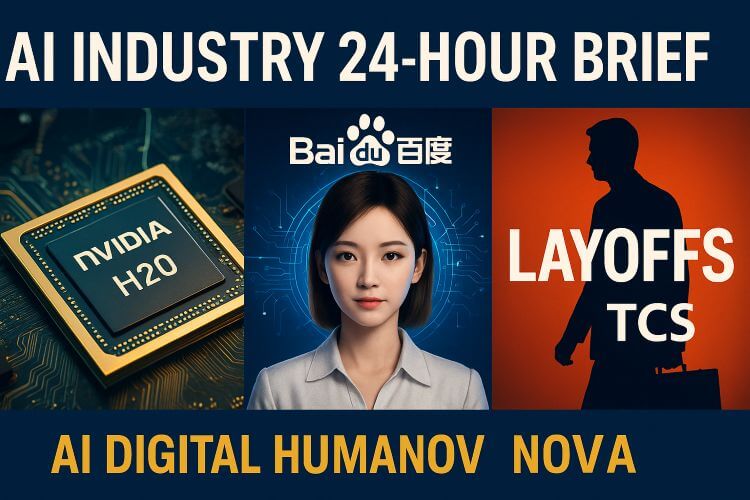AI Navigation
- articleAI Trends
- lightbulb_2AI Tips
- assistant_navigationAI Navigation
- heatHot Articles
- emergency_heat_2Hot Tips
AI Industry 24-Hour Brief:NVIDIA H20 Chip Orders Surge, Baidu Launches Digital Human NOVA, TCS Lays Off 2% of Staff
Over the past day, the global AI and technology sectors have continued to evolve rapidly, with multiple major developments drawing attention:

1. NVIDIA Adds 300,000 H20 Chip Orders, Targeting the Chinese Market
Driven by stronger-than-expected demand in China, NVIDIA has urgently placed an order with TSMC for an additional 300,000 H20 chips. Currently, NVIDIA’s H20 inventory stands at about 600,000–700,000 units, and the company sold approximately 1 million H20 chips in 2024. This order follows the U.S. government’s recent decision to lift the April export ban and allow NVIDIA to resume H20 GPU sales to China. However, shipments still require a U.S. Department of Commerce export license, meaning delivery is still subject to regulatory approval.
2. Baidu Huiboxing Unveils NOVA Digital Human Tech, Ushering in the Mass Production Era of Virtual Anchors
Baidu Huiboxing has launched its next-generation digital human technology, NOVA, achieving three key breakthroughs: script generation with multimodal coordination, an AI brain for real-time decision-making, and high-efficiency human replication.
Powered by the ERNIE 4.5 model’s “script master” mode, NOVA can generate high-quality live-streaming scripts and synchronize the digital human’s expressions, voice, and gestures. Its AI brain can autonomously receive live data, orchestrate multiple agents for interactive Q&A, and adapt output to trending topics. Remarkably, only 10 minutes of real human sample data are needed to accurately replicate voice, movements, and atmosphere. Scheduled for full release in October, NOVA means ordinary users will soon be able to wield livestreaming capabilities comparable to top-tier hosts—marking the beginning of mass-scale replication of superstar livestreamers.
3. Novo Nordisk Stock Plunges; AI Not a Core Driver
Global pharmaceutical giant Novo Nordisk slashed its 2025 full-year sales and operating profit forecast as demand for its blockbuster weight-loss drug Wegovy slowed in the critical U.S. market, triggering a stock drop of over 20%. Competition has intensified as Eli Lilly’s Tirzepatide and similar products quickly erode Wegovy’s market share. While Novo Nordisk is likely leveraging AI to improve R&D efficiency and operations, AI technology itself is not a direct driver of its revenue or stock performance.
4. India’s TCS to Lay Off 2% of Workforce, Highlighting AI’s Impact on Traditional IT
India’s largest IT company, Tata Consultancy Services (TCS), announced a 2% workforce reduction, cutting over 12,000 mid- to senior-level management positions. TCS employs more than 500,000 staff and is considered a bellwether for India’s $283 billion software industry and white-collar employment. The company stated the move is to “prepare for the future,” redirecting resources to artificial intelligence as it embraces large-scale AI deployment amid disruption to traditional business models.
5. Shanghai Aims for Full Autonomous Driving Access in Pudong by Year-End
The Shanghai government announced plans for Pudong New Area to achieve full autonomous driving test-road access by the end of 2025 (excluding key areas like Lujiazui). With the third batch of autonomous driving test roads opened in March, Shanghai has now surpassed 2,700 km of test roads. By 2027, the city aims to expand to 5,000 km of open roads across 2,000 square kilometers, building one of the world’s leading ecosystems for autonomous driving.
From NVIDIA’s chip orders to Baidu’s breakthrough in digital human technology, from TCS’s layoffs to Shanghai’s autonomous driving roadmap, the past 24 hours underscore how AI is rapidly permeating every industry—serving both as an engine for innovation and a force challenging traditional business models.
For more AI updates, visit: https://iaiseek.com